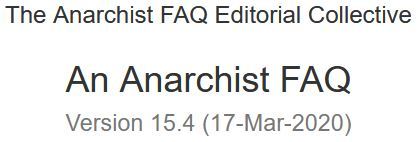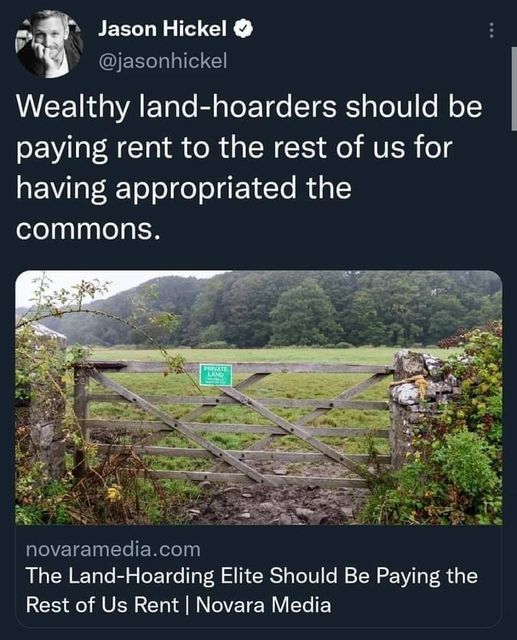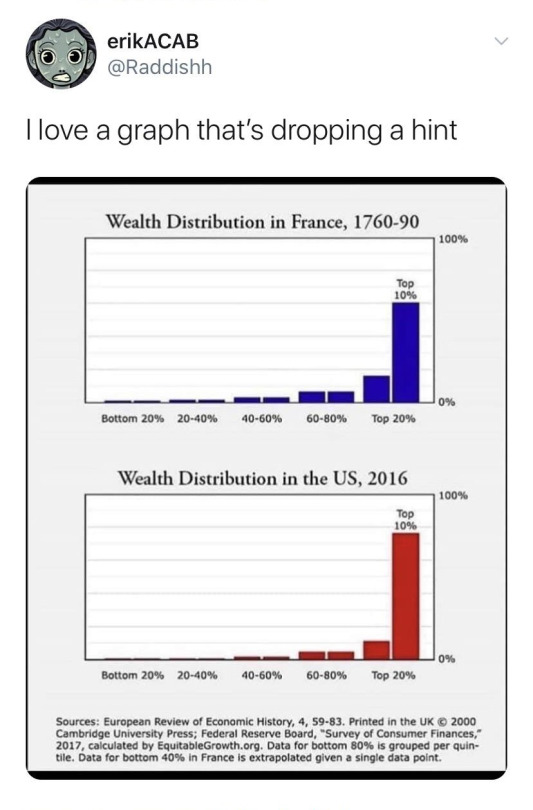#economics
Text
I don't disagree that restaurants as an institution have numerous problems, but sometimes I'll see a restaurant-critical post cross my dash whose author clearly just looked up the history of the word "restaurant" and immediately started banging on about how the food service industry in its entirety is a bourgeois invention that sprang from the aftermath of the French Revolution, and prior to that time people only ever ate food prepared in the home, evidently completely unaware of the copious evidence that the public fried-food stand is literally as old as writing.
1K notes
·
View notes
Text

678 notes
·
View notes
Text
https://debra-591.ludgu.top/f/ktFdYO2
#jessa hinton#crust punk#hrithik roshan#class 1a#angst#drake#erica fett#memesdaily#ashley benson#thick blonde#tomioka giyuu#rainn#economics
126 notes
·
View notes
Text

A.2.4 Are anarchists in favour of “absolute” liberty?
No. Anarchists do not believe that everyone should be able to “do whatever they like,” because some actions invariably involve the denial of the liberty of others.
For example, anarchists do not support the “freedom” to rape, to exploit, or to coerce others. Neither do we tolerate authority. On the contrary, since authority is a threat to liberty, equality, and solidarity (not to mention human dignity), anarchists recognise the need to resist and overthrow it.
The exercise of authority is not freedom. No one has a “right” to rule others. As Malatesta points out, anarchism supports “freedom for everybody … with the only limit of the equal freedom for others; which does not mean … that we recognise, and wish to respect, the ‘freedom’ to exploit, to oppress, to command, which is oppression and certainly not freedom.” [Errico Malatesta: His Life and Ideas, p. 53]
In a capitalist society, resistance to all forms of hierarchical authority is the mark of a free person — be it private (the boss) or public (the state). As Henry David Thoreau pointed out in his essay on “Civil Disobedience” (1847)
“Disobedience is the true foundation of liberty. The obedient must be slaves.”
#faq#anarchy faq#revolution#anarchism#daily posts#communism#anti capitalist#anti capitalism#late stage capitalism#organization#grassroots#grass roots#anarchists#libraries#leftism#social issues#economy#economics#climate change#climate crisis#climate#ecology#anarchy works#environmentalism#environment#solarpunk#anti colonialism#mutual aid#cops#police
55 notes
·
View notes
Text
8 minutes of what I consider to be a prime example of unrestricted warfare. Everytime I hear about algorithms and AI , I remember the good old Inslaw affair with PROMIS...
56 notes
·
View notes
Link
Big corporations tell us that policies and supply chains are to blame for rising costs, but there’s a big part of the story they don’t want you to know: These giant corporations are themselves largely responsible for higher prices.
According to a new report by the Federal Trade Commission, the largest grocery retailers — which include Walmart, Kroger, and Amazon, which owns Whole Foods — used the pandemic as an excuse to raise prices across the board. The same is true for big agribusinesses like Tyson Foods and DuPont, which sell the lion’s share of meat products and seeds.
These giant companies wrote themselves a blank check during COVID, which they now expect us to pay for.
What all of these corporations have in common is they always want to get bigger. Why? Because when consumers have fewer choices, corporations can force us to pay higher prices. This is especially true with food, which none of us can live without. And according to the FTC, a big reason for these higher prices is corporate greed.
Time and again, big companies tell us that if they could only get bigger, they would pass savings on to consumers. This is almost never true. Instead, they give money back to their investors and reward executives — like Walmart’s Doug McMillon, who takes home over $25 million a year, and Kroger’s Rodney McMullen, who makes more than $19 million. That’s 671 times more than the amount an average Kroger’s worker makes.
Corporate consolidation can have deadly consequences. In health care, which my organization tracks closely, we see that the domination of private insurance by a handful of companies — Aetna, United Healthcare, and Cigna — leads to bigger bills, worse health outcomes, and lost lives.
56 notes
·
View notes
Text

Boris Mikhailov Untitled (Kharkiv, Ukraine 1998). Life-size photograph [236 × 126 cm / 93 × 50 in.] from the 2019 "Forbidden Image" exhibition in Kyiv, Ukraine.
#photography#boris mikhailov#dark#city#kharkiv#ukraine#art history#politics#economics#life#humanity#hard times#art#1990s#surreal#history#people#urban#sociology#activism#📚
49 notes
·
View notes
Text
I think the thing about the Watcher drama is that there is an actually good example of YouTube channel/s launching a streaming service. The differences are that:
Nebula was started by several content creators/channels, meaning there’s already a greater variety of content.
The channels involved have never stopped updating their YouTube channels, the streaming service’s main attractions being early access and free from ads with some bonus content.
What I’m saying is that it was a tiny bit conceited to think that they as one content creating group alone could provide enough content to merit a paywall of this proportion when:
Extra History, Legal Eagle, Real Engineering, Lindsay Ellis, Tale Foundry, ReligionForBreakfast, and several more put together to provide enough content for their one streaming service. And even then acknowledging that it’s not realistic to make your entire audience forced to subscribe for content but at least giving them an adfree option. I personally have a precarious finance and so I watch my favorites of those content creators on YouTube and hopefully give them adrevenue that way. It’s generally better for any company to diversify their revenue streams rather than putting all their eggs in one basket, especially if you then try to balance that basket on a spinning plate.
So I’m glad that they have changed their minds but they really shouldn’t have needed to be told this.
#watcher#youtube#economics#I’ve seen a couple of comments on their apology video mentioning the need for a cfo#probably a good idea#also I just think I pay enough of a price by enduring bergara’s paranormal nonsense
23 notes
·
View notes
Text
i keep imagining a world where i can live in peace with myself. where i don't need to stare at my bank details in worry. where i don't need to be envious of everyone's trips abroad everywhere. where i don't need to hate the mirror. where i don't need to fill my stomach with water instead of food because i hate myself too much and beauty is everything everyone cares about. and to be beautiful i need to have money. and i have neither. and the next second i see the news and girls younger than me are murdered by bombs. and i have the nerve to be sad about my ugliness. is there a world where none of this exists? is there a world where i can look at you and see you and not your faults? is there a world where we don't compete? is there a world where those girls don't die? is there a world where bombs don't even exist and the most harmful weapon we have is the thorns of a wild rose. where we can lie on grass together, counting stars that are far, far away from our grasp but somehow that'd be completely fine.
#writeblr#vent#light academia#poemblr#chaotic academia#dark academia#poetry#quotes#burnt out#aesthetic#cottagecore#flowercore#cottage aesthetic#naturecore#nature aesthetic#cozycore#capitalism#economics#poverty#eat the rich#politics#late stage capitalism#beauty#beautiful#pretty face#pretty privilege#spilled truth#spilled ink#spilled words#spilled thoughts
22 notes
·
View notes
Text




23.04.2024
3/100 days of productivity! It rained the whole day today. Plus I got my period sooo was in bed most of the day. Managed to get some boring tasks done like light cleaning and organizing. I did not managed to work on my academic tasks, so I am in my bed doing some last min studying before going to bed. As you can see had a bit too much coffee, I'll be up for a while :')
#studyblr#100dop#100 days of productivity#100 days of studying#100 days of self discipline#dark academia#light academia#chaotic academia#studyspo#study aesthetic#30 days of intentionality#notes#study blog#economics#university#exam season#bologna#Bologna
22 notes
·
View notes
Text

#lgbt#lgbtq#lgbtqia#economics#economy#capitalism#politics#twitter#tweets#tweet#meme#memes#funny#lol#humor
72K notes
·
View notes
Text




The French really don’t fuck around.
#France#emmanuel macron#capitalism#socialism#america#usa#democrats#republicans#gop#twitter#economics#fox news#pensions#macron
204K notes
·
View notes
Text
I feel like a good shorthand for a lot of economics arguments is "if you want people to work minimum wage jobs in your city, you need to allow minimum wage apartments for them to live in."
"These jobs are just for teenagers on the weekends." Okay, so you'll use minimum wage services only on the weekends and after school. No McDonald's or Starbucks on your lunch break.
"They can get a roommate." For a one bedroom? A roommate for a one bedroom? Or a studio? Do you have a roommate to get a middle-wage apartment for your middle-wage job? No? Why should they?
"They can live farther from city center and just commute." Are there ways for them to commute that don't equate to that rent? Living in an outer borough might work in NYC, where public transport is a flat rate, but a city in Texas requires a car. Does the money saved in rent equal the money spent on the car loan, the insurance, the gas? Remember, if you want people to take the bus or a bike, the bus needs to be reliable and the bike lanes survivable.
If you want minimum wage workers to be around for you to rely on, then those minimum wage workers need a place to stay.
You either raise the minimum wage, or you drop the rent. There's only so long you can keep rents high and wages low before your workforce leaves for cheaper pastures.
"Nobody wants to work anymore" doesn't hold water if the reason nobody applies is because the commute is impossible at the wage you provide.
88K notes
·
View notes
Text

A.2.3 Are anarchists in favour of organisation?
Yes. Without association, a truly human life is impossible. Liberty cannot exist without society and organisation. As George Barrett pointed out:
“To get the full meaning out of life we must co-operate, and to co-operate we must make agreements with our fellow-men. But to suppose that such agreements mean a limitation of freedom is surely an absurdity; on the contrary, they are the exercise of our freedom.
“If we are going to invent a dogma that to make agreements is to damage freedom, then at once freedom becomes tyrannical, for it forbids men to take the most ordinary everyday pleasures. For example, I cannot go for a walk with my friend because it is against the principle of Liberty that I should agree to be at a certain place at a certain time to meet him. I cannot in the least extend my own power beyond myself, because to do so I must co-operate with someone else, and co-operation implies an agreement, and that is against Liberty. It will be seen at once that this argument is absurd. I do not limit my liberty, but simply exercise it, when I agree with my friend to go for a walk.
“If, on the other hand, I decide from my superior knowledge that it is good for my friend to take exercise, and therefore I attempt to compel him to go for a walk, then I begin to limit freedom. This is the difference between free agreement and government.” [Objections to Anarchism, pp. 348–9]
As far as organisation goes, anarchists think that “far from creating authority, [it] is the only cure for it and the only means whereby each of us will get used to taking an active and conscious part in collective work, and cease being passive instruments in the hands of leaders.” [Errico Malatesta, Errico Malatesta: His Life and Ideas, p. 86] Thus anarchists are well aware of the need to organise in a structured and open manner. As Carole Ehrlich points out, while anarchists “aren’t opposed to structure” and simply “want to abolish hierarchical structure” they are “almost always stereotyped as wanting no structure at all.” This is not the case, for “organisations that would build in accountability, diffusion of power among the maximum number of persons, task rotation, skill-sharing, and the spread of information and resources” are based on “good social anarchist principles of organisation!” [“Socialism, Anarchism and Feminism”, Quiet Rumours: An Anarcha-Feminist Reader, p. 47 and p. 46]
The fact that anarchists are in favour of organisation may seem strange at first, but it is understandable. “For those with experience only of authoritarian organisation,” argue two British anarchists, “it appears that organisation can only be totalitarian or democratic, and that those who disbelieve in government must by that token disbelieve in organisation at all. That is not so.” [Stuart Christie and Albert Meltzer, The Floodgates of Anarchy, p. 122] In other words, because we live in a society in which virtually all forms of organisation are authoritarian, this makes them appear to be the only kind possible. What is usually not recognised is that this mode of organisation is historically conditioned, arising within a specific kind of society — one whose motive principles are domination and exploitation. According to archaeologists and anthropologists, this kind of society has only existed for about 5,000 years, having appeared with the first primitive states based on conquest and slavery, in which the labour of slaves created a surplus which supported a ruling class.
Prior to that time, for hundreds of thousands of years, human and proto-human societies were what Murray Bookchin calls “organic,” that is, based on co-operative forms of economic activity involving mutual aid, free access to productive resources, and a sharing of the products of communal labour according to need. Although such societies probably had status rankings based on age, there were no hierarchies in the sense of institutionalised dominance-subordination relations enforced by coercive sanctions and resulting in class-stratification involving the economic exploitation of one class by another (see Murray Bookchin, The Ecology of Freedom).
It must be emphasised, however, that anarchists do not advocate going “back to the Stone Age.” We merely note that since the hierarchical-authoritarian mode of organisation is a relatively recent development in the course of human social evolution, there is no reason to suppose that it is somehow “fated” to be permanent. We do not think that human beings are genetically “programmed” for authoritarian, competitive, and aggressive behaviour, as there is no credible evidence to support this claim. On the contrary, such behaviour is socially conditioned, or learned, and as such, can be unlearned (see Ashley Montagu, The Nature of Human Aggression). We are not fatalists or genetic determinists, but believe in free will, which means that people can change the way they do things, including the way they organise society.
And there is no doubt that society needs to be better organised, because presently most of its wealth — which is produced by the majority — and power gets distributed to a small, elite minority at the top of the social pyramid, causing deprivation and suffering for the rest, particularly for those at the bottom. Yet because this elite controls the means of coercion through its control of the state (see section B.2.3), it is able to suppress the majority and ignore its suffering — a phenomenon that occurs on a smaller scale within all hierarchies. Little wonder, then, that people within authoritarian and centralised structures come to hate them as a denial of their freedom. As Alexander Berkman puts it:
“Any one who tells you that Anarchists don’t believe in organisation is talking nonsense. Organisation is everything, and everything is organisation. The whole of life is organisation, conscious or unconscious … But there is organisation and organisation. Capitalist society is so badly organised that its various members suffer: just as when you have a pain in some part of you, your whole body aches and you are ill… , not a single member of the organisation or union may with impunity be discriminated against, suppressed or ignored. To do so would be the same as to ignore an aching tooth: you would be sick all over.” [Op. Cit., p. 198]
Yet this is precisely what happens in capitalist society, with the result that it is, indeed, “sick all over.”
For these reasons, anarchists reject authoritarian forms of organisation and instead support associations based on free agreement. Free agreement is important because, in Berkman’s words, ”[o]nly when each is a free and independent unit, co-operating with others from his own choice because of mutual interests, can the world work successfully and become powerful.” [Op. Cit., p. 199] As we discuss in section A.2.14, anarchists stress that free agreement has to be complemented by direct democracy (or, as it is usually called by anarchists, self-management) within the association itself otherwise “freedom” become little more than picking masters.
Anarchist organisation is based on a massive decentralisation of power back into the hands of the people, i.e. those who are directly affected by the decisions being made. To quote Proudhon:
“Unless democracy is a fraud and the sovereignty of the People a joke, it must be admitted that each citizen in the sphere of his [or her] industry, each municipal, district or provincial council within its own territory … should act directly and by itself in administering the interests which it includes, and should exercise full sovereignty in relation to them.” [The General Idea of the Revolution, p. 276]
It also implies a need for federalism to co-ordinate joint interests. For anarchism, federalism is the natural complement to self-management. With the abolition of the State, society “can, and must, organise itself in a different fashion, but not from top to bottom … The future social organisation must be made solely from the bottom upwards, by the free association or federation of workers, firstly in their unions, then in the communes, regions, nations and finally in a great federation, international and universal. Then alone will be realised the true and life-giving order of freedom and the common good, that order which, far from denying, on the contrary affirms and brings into harmony the interests of individuals and of society.” [Bakunin, Michael Bakunin: Selected Writings, pp. 205–6] Because a “truly popular organisation begins … from below” and so “federalism becomes a political institution of Socialism, the free and spontaneous organisation of popular life.” Thus libertarian socialism “is federalistic in character.” [Bakunin, The Political Philosophy of Bakunin, pp. 273–4 and p. 272]
Therefore, anarchist organisation is based on direct democracy (or self-management) and federalism (or confederation). These are the expression and environment of liberty. Direct (or participatory) democracy is essential because liberty and equality imply the need for forums within which people can discuss and debate as equals and which allow for the free exercise of what Murray Bookchin calls “the creative role of dissent.” Federalism is necessary to ensure that common interests are discussed and joint activity organised in a way which reflects the wishes of all those affected by them. To ensure that decisions flow from the bottom up rather than being imposed from the top down by a few rulers.
Anarchist ideas on libertarian organisation and the need for direct democracy and confederation will be discussed further in sections A.2.9 and A.2.11.
#faq#anarchy faq#revolution#anarchism#daily posts#communism#anti capitalist#anti capitalism#late stage capitalism#organization#grassroots#grass roots#anarchists#libraries#leftism#social issues#economy#economics#climate change#climate crisis#climate#ecology#anarchy works#environmentalism#environment#solarpunk#anti colonialism#mutual aid#cops#police
24 notes
·
View notes
Text

17K notes
·
View notes
